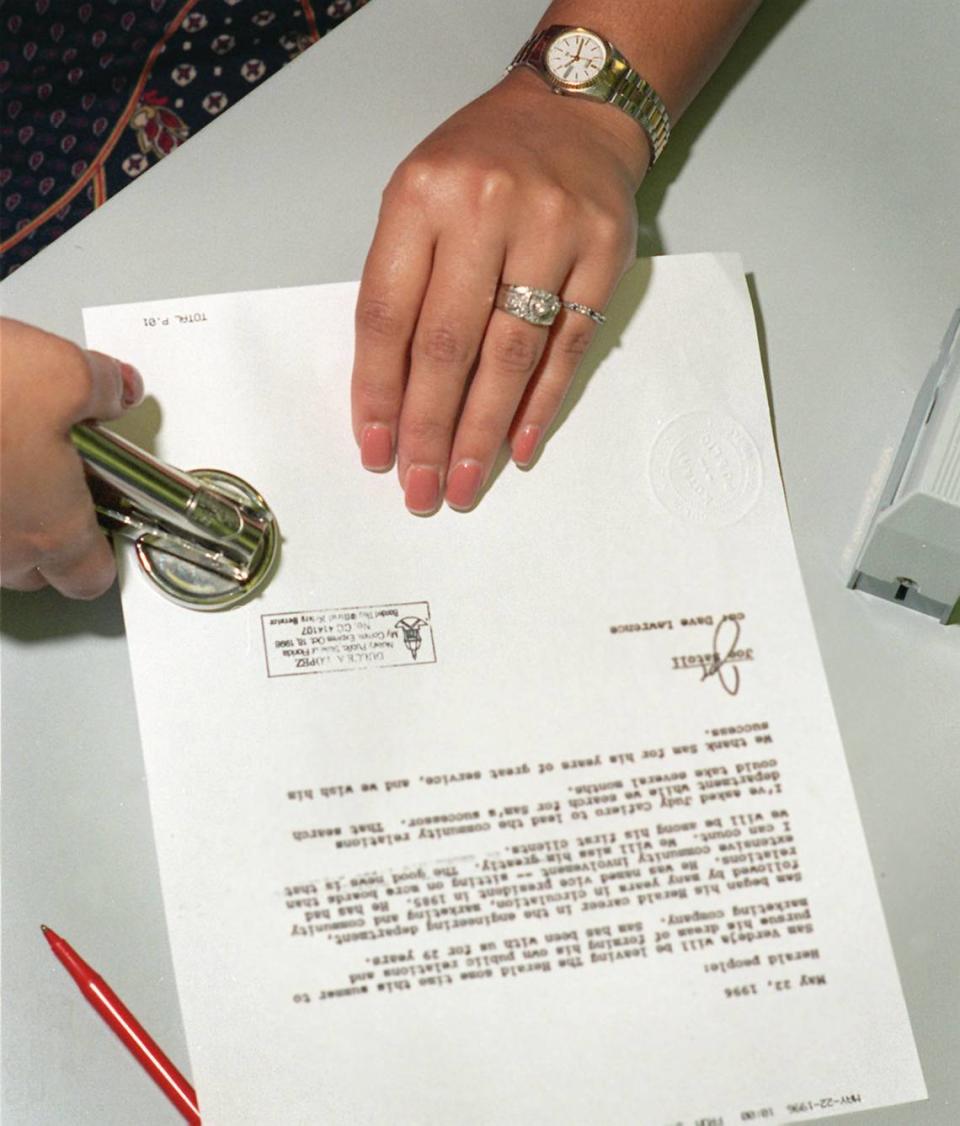No texting and driving, minimum wage change and new smoking age. Here are 2020’s new laws
2020 is expected to bring new resolutions, “2020 vision” memes and jokes about hosting Great Gatsby-esque parties.
It’s also bringing a batch of new laws.
While most of Florida’s new laws went into effect over the summer or upon Gov. Ron DeSantis’ signing them into law, there are a few that will go into effect on Jan. 1, 2020.
Here are five you need to know about:
Texting and driving? Get ready for a ticket

Starting Wednesday, Florida Highway Patrol troopers and other law enforcement agencies will be ticketing drivers who are caught texting and driving.
Texting while driving has been illegal in Florida for years, but police couldn’t stop drivers for it unless they were pulled over for something else, like speeding.
The new law, which went into effect in July, changed this and gave law enforcement agencies the option to give drivers a grace period through Dec. 31.
During this time, troopers and officers could pull drivers over and give them a verbal or written warning instead of a ticket.
The Florida Highway Patrol says it issued 1,087 warnings for texting and driving from July 1 through Dec. 30. From July 1 through Dec. 29, 2019, there have been 1,220 citations issued statewide by all law enforcement agencies for texting and driving, according to the Florida Department of Highway Safety and Motor Vehicles.
Once Jan. 1, 2020, rolls around, drivers who are caught texting while driving will receive a ticket.
Drivers can still use their phone’s Bluetooth-enabled GPS, make hands-free phone calls and read emergency messages, such as weather alerts.
You can also still text behind the wheel if the car is stopped, including at a red light.
The only exception is in school and work zones, where drivers cannot text, type an address into their GPS or do anything else that requires them to touch a phone, unless it is an emergency.
The tickets are the final phase of a new law the governor signed in May that made texting while driving a primary offense.
How much is the fine?
For a first offense, it’s $30 plus court fees. For a second offense, it’s $60 plus court fees and three points on a driver’s record, according to the Florida Department of Highway Safety and Motor Vehicles.
If you’re caught texting or using your phone (unless it’s hands-free) in a school zone and work zone, you will get a $60 fine plus court fees and three points on a driver’s record, even if it was your first offense, according to the department.
Florida’s minimum wage to increase

Florida’s minimum wage of $8.46 will be slightly increasing to $8.56 an hour in 2020, according to the Florida Department of Economic Opportunity.
This means you would make $68.48 instead of $67.68 for an eight-hour work day, not including taxes, as of Jan. 1, 2020.
Tipped workers will also see a small increase from $5.44 per hour to $5.54 an hour, in addition to tips.
Those looking for a bigger pay raise will have to wait until November’s elections to have their voices heard.
One of the constitutional amendments will be asking voters whether the state’s minimum wage should gradually rise to $15 an hour.
If approved by at least 60 percent of voters, the amendment would increase Florida’s minimum wage to $10 an hour on Sept. 30, 2021, and increase it by $1 an hour each year until it hits $15 an hour on Sept. 30, 2026.
Legal age to smoke increases to 21

Anyone under 21 can no longer legally buy cigarettes, cigars or any other tobacco product in the United States, including electronic cigarettes and vaping products that contain nicotine, according to the U.S. Food and Drug Administration.
The new law, which raises the legal buying age from 18 to 21 nationwide, was part of a spending bill passed by Congress and signed by President Donald Trump on Dec. 20, according to the FDA.
Many states had already changed the legal buying age to 21 prior to the new bill, according to The Associated Press.
In Florida, you had to be at least 18 to purchase a cigarette, though the state’s Senate did attempt to pass a bill known as “Tobacco21” or T21 (Bill 1618) earlier this year to raise the age to 21.
It was ultimately killed by the state House in May, according to the Tampa Bay Times.
While the nationwide law went into effect last week, it’s close enough to the new year to make it onto this list.
The age change will also be new to most of Florida, except for those living in Alachua County, home to the University of Florida. The county became the first in Florida to raise the minimum age for tobacco sales from 18 to 21 last January.
Remembering those who serve

A veteran-themed “Honor and Remember” flag will officially be designated as Florida’s “emblem” Jan. 1.
The red, white and blue “Honor and Remember” flag was created to recognize the “service and sacrifice of the men and women of the United States Armed Forces who have given their lives in the line of duty,” according to the bill. It was signed into law on June 26.
The “distinctive, yet simple” design includes a gold star outlined by a blue star. Inside the gold star is a folded flag sprinkled with white stars. Above it is a bright flame. The rest of the flag is red with white borders.
Each imagery on the flag symbolizes a different aspect of the flag’s message, according to honorandremember.org.
The legislation (Bill 00427) authorizes the “Remember” flag, which is required to be manufactured in the United States, to be displayed at any state-owned building where the United States flag is displayed and at any state-owned military memorial.
“As a veteran, I’m proud to file this bill to honor the servicemen and women who have lost their lives in the line of duty and to pay tribute to the families they left behind,” said Rep. Tommy Gregory to ABC7 in February when he filed the bill. “I believe flying this flag will be an important part of our state becoming the most veteran-friendly state in the nation.”
The flag can be displayed on Veterans Day, Gold Star Mother’s Day or on a day when a Florida resident who is a member of the United States Armed Forces loses his or her life in the line of duty, according to the law.
Local governments can also display the flag in a manner that is “designed” to be visible to the public and has no more than two additional flags alongside it on a flagpole.
The legislation also gives local governments, agencies and departments until July 1, 2020, to create or adopt regulations relating to the flag.
Agencies and local governments are not required to buy the flag, according to ABC7.
Florida is one of 26 states to officially recognize the flag as the United States’ “public symbol of remembrance” as of Tuesday, according to honorandremember.org
If the flag seems familiar to you, it’s because the city of Miami unveiled an “Honor and Remember” flag alongside its “Honor and Sacrifice” counterpart in a July ceremony as part of its “commitment to becoming a more veteran-welcome city,” according to its Facebook page.
The ceremony was five years in the making, according to WSVN.
Your legal documents can be electronically notarized

Visiting a notary public in person is so 2019. Once 2020 is here, you’ll be able to have your documents electronically notarized in Florida.
Under the updated law (Bill 00409) the signer and witnesses can appear before a registered online notary public at the time of notarization either in person or by “means of audio-video communication technology.”
This means technology allowed “under applicable law” can be used by the notary public and the signer to see, hear and communicate with one another in real-time.
The law also lists various protections to increase digital security such as:
▪ Requiring the notary public’s electronic signature to be unique, able to be independently verified and having “access protection through the use of passwords or codes under control of the notary public.”
▪ A person cannot require a notary public to “perform a notarial act” to an electronic record with a form of technology that the notary public has not chosen to use.
▪ The online notary public must keep electronic journals of online notarizations and an “uninterrupted and unedited copy” of select audio-video communication recording. The recording will include all actions and spoken words between the notary public, the signer, witnesses, and the signing of any records.
A notary public also won’t be allowed to notarize a signature on the document unless he or she personally knows or has “satisfactory evidence” about the signer’s identity, which may include government-issued documents such as a driver’s license.
To learn more about the electronic notarization law, visit flgov.com

